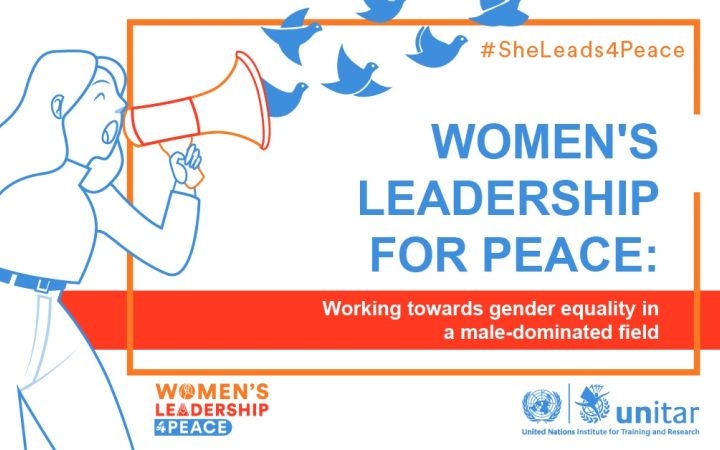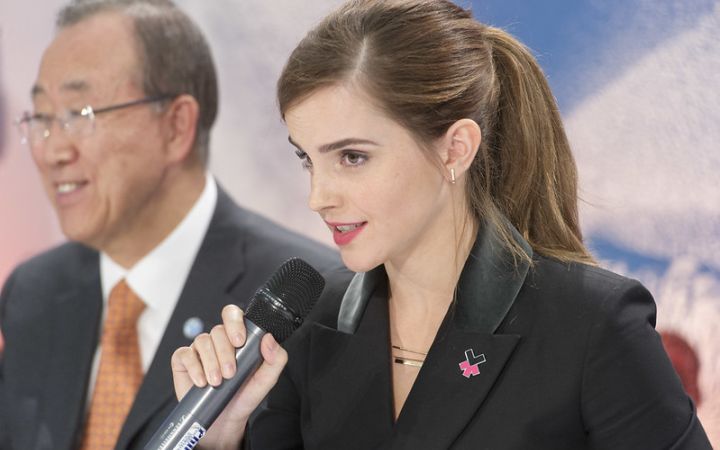Women shouldn't feel honoured to be at the decision-making table - it is their right, it is where they deserve to be, and it is where they should be.
Panellist in a UNITAR webinar on Women's Leadership in Pandemic/Humanitarian Crisis Preparedness and Response, 2020
Interactive Virtual Panel Event on the Occasion of International Women's Day 2021
On the 11th March 2021, during the week of International Women's Day, UNITAR officially launched the ground-breaking Women's Leadership for Peace programme online.
UNITAR has developed the Women's Leadership for Peace programme as a reflection of its position as an internationally recognised leader in supporting the capacity development of Member States, international and regional organisations and other stakeholders working to contribute to lasting peace and security in the world. With a particular focus on UNITAR's experience in providing capacity development opportunities to those working on the Women, Peace and Security (WPS) agenda, the Women's Leadership for Peace programme will provide participants of the programme with an unrivalled set of growth opportunities through shared experiences, and the further development of knowledge, and skills to advance to leadership positions in their respective contexts.
Therefore, UNITAR hosted a panel discussion in the form of an open virtual debate with the participation of renowned gender champions in the peace and security sector as well as the wider public. As part of UNITAR's commitments to gender equality and women's empowerment, the virtual public event marked the occasion of International Women's Day 2021.
Partnership is one of the key guiding principles of UNITAR’s work, equally underpinning the development and implementation of the Women’s Leadership for Peace programme. During the 6-month needs assessment process for the programme, the UNITAR team reached out to thought leaders and pioneers in the Women, Peace and Security as well as Women’s Leadership fields. The exchanges we had were inspiring and thought provoking. UNITAR therefore used the week of International Women's Day as an opportunity to bring together a few selected experts and thought leaders, who were involved in this process, to take this discussion to the next level.
With this virtual panel event, UNITAR aimed to:
- Give a timely and much-needed platform for advancing discussions about the importance and current challenges of women in leadership within the peace and security fields;
- Share diverse perspectives, by giving voice to experts from the fields of human rights, the security sector, the world of diplomacy as well as training;
- Discuss the role of training and capacity building in advancing more women to leadership positions in the peace and security fields;
- Further increase engagement with the programme with an interested audience, including partners, future beneficiaries, and the donor community.
Speakers
Moderator: Dr Tina Robiolle, Academic Director, Lecturer, SciencesPo, Paris School of International Affairs
Keynote speaker: Mme Bineta Diop, African Union Special Envoy on Women, Peace and Security
Panellists:
- H.E. Ms Elayne Whyte Gómez, Former Ambassador and Permanent Representative of Costa Rica to the United Nations in Geneva (2014-2020) and President of the U.N. Conference that negotiated and adopted the Treaty on the Prohibition of Nuclear Weapons
- Ms Kirsi Henriksson, Director of the Crisis Management Centre, Finland; President of the Foundation Council of DCAF – Geneva Centre for Security Sector Governance
- Colonel William Nortey, Consultant on peacekeeping and gender, UNITAR
- Dr Tracy Ostertag, Security Sector Reform Advisor and Former Gender Advisor for the Canadian Police Mission in Ukraine
- Ms María Ximena Figueroa, Co-founder of the Chaparralunas Women's Network for Peace, Colombia
Background: A Moment to Make Peace More Inclusive and Sustainable
In 2020, both the 25th anniversary of the Beijing Declaration (1995) and the 20th anniversary of the UN Security Council Resolution 1325 (2000) marked key opportunities to take further steps in ensuring that women's empowerment and gender equality are at the heart of all aspects of the United Nations' work. To contribute to the advancement of more women in the peace and security fields into leadership positions through targeted capacity building measures, UNITAR started developing the Women's Leadership for Peace programme in 2020. This programme will leverage all UNITAR's experience in providing skills and knowledge to overcome the underrepresentation of women in formal and informal mechanisms and institutions linked to sustaining peace.
According to the Council on Foreign Relations, between 1992 and 2018, women represented only 13% of negotiators, 3% of mediators and only 4% of signatories in major peace processes. Similarly, research by the Inter-Parliamentary Union and UN Women showed that in January 2019, the global average of women ministers was 20.7% compared to 18.3% in conflict and post-conflict countries. Moreover, data from the UN Security Council shows that, as of August 2020, women made up 41 per cent of heads of United Nations peacekeeping operations and special political missions. Since the outbreak of the COVID-19 pandemic, many have noted how women leaders around the world have demonstrated successful management of the COVID-19 pandemic based on inclusive, evidence-based leadership; yet, women lead only seven per cent of countries.
Increasing the number of women elevated to lead and contribute to peace processes at all levels is not just desirable from an equity perspective, but it is crucial for sustaining peace. Data consolidated by UN Women provides evidence that women's direct participation in peace negotiations increases the sustainability and the quality of peace. A study investigating 82 peace agreements in 42 armed conflicts between 1989 and 2011 found that when women participate in peace processes, the resulting agreement is 35 per cent more likely to last at least 15 years. One reason for this is that women so often shape societal values and facilitate their access to decision-making; thereby, promoting social cohesion and ensuring that agreements are embedded into the social fabric in sustainable, long-lasting and transformational ways.
The coinciding of the COVID-19 pandemic with the aforementioned 20th anniversary of the Women, Peace and Security agenda represents a critical moment to develop a more inclusive response, committed to ensuring that women are heard, protected, and empowered. As national and international actors pivot their focus to shape a post-COVID world and adapt existing development, peacebuilding and humanitarian programming to this new reality, providing opportunities for women in leadership positions will become increasingly important in order to integrate gender-sensitivity into crisis management.



